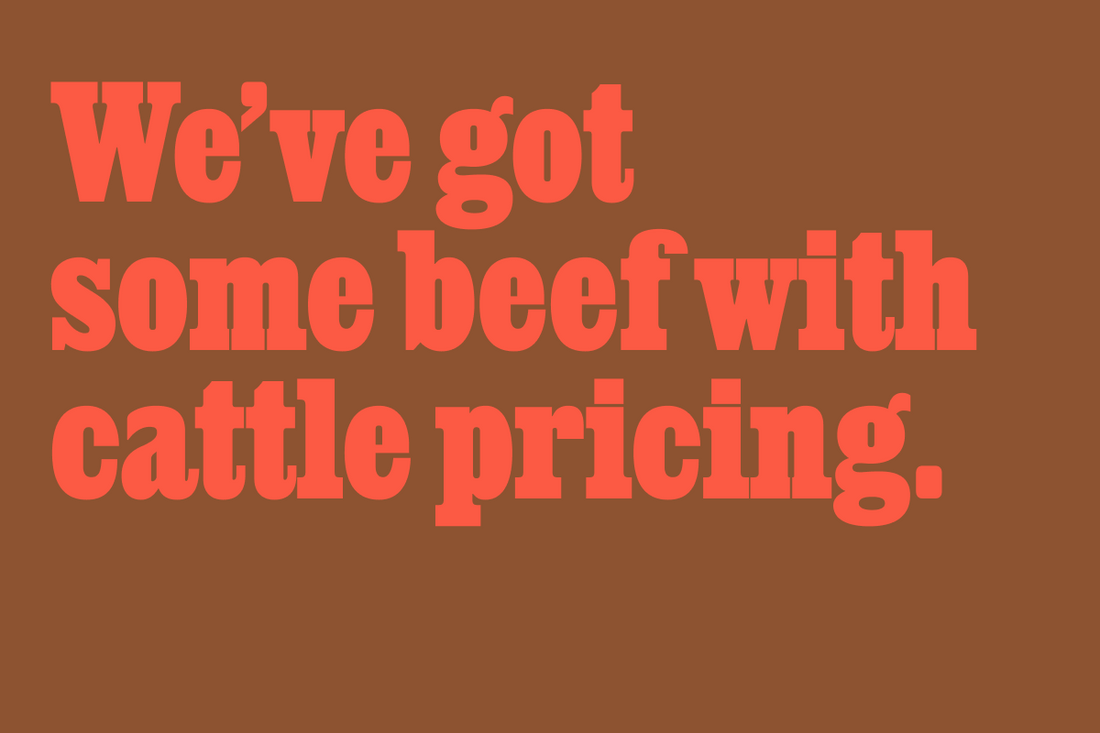
Beef prices are low and falling right now. They were sky high a year and a half ago. What happened? Who's in charge of setting them? What pushes them up or down? We're pretty preoccupied with these questions here at Happy Valley Meat Co., and we figure you and your respective bottom lines are curious as well. It helps to begin by getting a handle on the basics of how most beef in this country is bought and sold. Here's how it usually works:
- Let's imagine you're an upstart cattle farmer. You buy your 20-acre slice of heaven and 20 steer calves from your buddy down the road. Those calves cost you maybe $1,000 each. For 8 months or so, you give your 20 beef cattle all the tender loving care a farmer's capable of. That means feeding and moving them around, putting gas in your tractor, paying the interest on your farm mortgage, etc. Let's say that comes out to $1,000 per animal also.
- At 24 months old, your sweet little calves are now swaggering, chubby, 1,200 lb beauties and you're ready to sell 'em off. You load them into your trailer and drive them to the nearest “sale barn” where buyers will bid on your herd as a whole, or “lot”. The auctioneer will start the bidding at a “fair market price” (more on this in a jiffy)—what you get depends on whether the buyers bid up or down from that starting price.
- From the sale barn, the buyer (often big meat companies like Cargill) will truck your cattle to a processing facility where they'll be mixed in with other animals in holding pens, then killed, processed, packed into boxes, and shipped to one of Cargill's customers (Wegman's or Chefs’ Warehouse or somebody like that). And there you have it!
As you can imagine, that moment at the sale barn when buyers decide what your cattle are worth is make-or-break. There are a handful of factors that impact that sale price, but it's important to note which factors don't impact it. Buyers don't want to know about the cost of calves, the monthly payments on your tractor, or what the hay you bought to make it through the winter ran you. They don't want to know that you sunk $2,000 apiece into these animals, and they don't want to know how much profit you'll need to make to stay afloat. Matter of fact, they don't ask a danged thing. Farmers are what's called “price takers” (as in here's what they're worth, take it or leave it).
Here's where we get in weeds. What's a fair market price? Fair question. It changes constantly, responding to a whole heap of factors, including the relative strength of the American dollar, feed prices, and investment in the beef industry by financial institutions trading in markets, like the Chicago Mercantile Exchange (CME).
The biggest contributors, though, are deals called “futures contracts”. On a basic level, futures contracts are a promise to deliver an agreed-upon amount of product, at an agreed-upon price, on an agreed-upon schedule. A company like Cargill will have contracts of two basic types – one with a company like Wegman's and one with cattle sellers. They’ll agree to sell Wegman’s something like 10,000 boxes of beef at $50 per box over the course of the next two years. And they’ll agree to purchase 40,000 lbs of live cattle (live cattle are sold in 40,000 lb units called “tickets”) at $1.75/lb for delivery on December 1, 2019. They're forever adjusting those deals in such a way as to drive costs down and profits up.
The result for farmers is a market that is both volatile and designed to pay the lowest possible price for live cattle. So "fair" has a lot more to do with the ebb and flow of global capital than the financial needs of your little farm and your little farmer bank account. Trading beef futures at the CME isn’t about what it cost you to raise your beef and it’s definitely not about your veterinary bills or your broken tractor. And you won't even know what all your hard work is worth until you've finished it. Sometimes you come out ahead, sometimes you wind up broke.
That kind of thing really grinds our gears at Happy Valley. Farmers working their tails off with no idea what their labor's worth. Farmers who’ve never left central Pennsylvania losing thousands of dollars in a matter of weeks because of some obscure adjustment in Chinese trade policy. Farmers who do everything right getting buried in debt and paperwork.
None of that for us. We go directly to farmers and we ask them what their beef is worth. That's our version of a fair market price. No sale barn, no global money markets. Just honest farmers raising great beef and getting a square deal for their hard work. Read more about our farms and our welfare promise.

